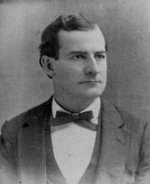The Anti-Imperialist League was formed in 1898 to lobby against the annexation of the Philippines from Spain during the Spanish-American War. Former Gov. George S. Boutwell of Massachusetts served as President of the League from its inception until his death in 1905. The League adopted an official communication to President McKinley that was delivered to him on 11/25/1898 [New York Times, 11/26/1898]. Former Secretary of State John Sherman responded to the League in a letter in which he stated that he hoped that the Philippines would become an independent nation, free of all foreign control [New York Times, 12/8/1898]. The same day that the League received the letter, it appointed several prominent men as Vice Presidents in an attempt to expand its sphere of influence. Among its VPs were former Pres. Grover Cleveland, Andrew Carnegie, Charles F. Adams, Carl Schurz, John G. Carlisle, and Gov. Pingree of Michigan [NYT 12/13/1898]. A later convert to the League was Sen. George F. Hoar, who helped organize the opposition in the Senate to the peace treaty signed with Spain [NYT 3/31/1899]. On 5/23/1899, the League added several other VPs, including Donelson Caffery LA, W. Bourke Cochran NY, Leland Stanford Jr., Gov. Andrew E. Lee SD, and several college presidents [NYT 5/24/1899]. Throughout 1899, the League established local affiliates to lobby locally for their programs [NYT 8/3/1899].
The League called a meeting that met in the Plaza Hotel in New York City on 6/25/1900. It was attended by Silver Republicans, Gold Democrats, and several independents. The League hoped to gather a sense of the political situation and to assess its options for helping defeat President McKinley. Many delegates had already endorsed William J. Bryan for President and did not want to have a third major ticket in the field. In the end, however, the gathering decided to call a "Liberty Congress" of anti-imperialists to meet after the Democratic National Convention [NYT 6/26/1900]. An open invitation for delegates to appear was issued on 7/23/00 [NYT 7/24/1900].
Anti-Imperialist Party National Convention, 1900 | |||
 |  |  | |
| Temporary Chairman | Permanent Chairman | Presidential Nominee | VP Nominee |
| Edwin B. Smith IL | Former Gov. George S. Boutwell MA | Former U.S. Rep. William J. Bryan NE | Former Vice President Adlai E. Stevenson CA |
The Anti-Imperialist Party National Convention assembled in Tomlinson Hall, Indianapolis IN, 11:00 a.m., 8/15/1900 for a two-day convention. The hall was set up for 600 delegates. Behind the stage were large images of Washington, Lincoln, Jefferson, and Oliver P. Morton. At the time the convention met, the delegates were divided over whether to nominate Bryan or introduce a third ticket. The day the convention assembled, the State Department released information that one of the delegates had been in correspondence with the Philippine resistance [NYT 8/14-16/1900].
When the convention assembled, Edwin Burritt Smith of Chicago was appointed the temporary chairman. There were 300 delegates on the floor. A.H. Tolman, a professor at the University of Chicago, read the Declaration of Independence, followed by a prayer by Herbert S. Bigelow of Cincinnati. Smith gave a short address in which he outlined that independent voters had been able to sway each of the previous six presidential elections.
The afternoon session began at 2:30 p.m. Chairman Smith called on delegates to give short speeches. General John Beatty of Columbus OH stated that he had always been a Republican and hoped that God would forgive him for voting for McKinley in 1896. His statement brought a great demonstration on the floor. Some delegates called for the nomination of William J. Bryan. Former Gov. Boutwell was appointed the permanent chairman. Boutwell gave a lengthy address to the delegates. Then a resolutions committee was appointed. During an evening session, the delegates were entertained with speeches. [NYT 8/16/1900].
A group called the Nationalist Independents were meeting at the same time in Indianapolis. They were looking for an opportunity to place a third major ticket in the field and wondered if they could do so with the assistance of the Anti-Imperialists [NYT 8/16/1900].
The proposed platform set forth the League's opposition to imperialism. A heated debate took place over a plank calling for the nomination of Bryan and Stevenson. Thomas M. Osborne, a delegate from Auburn NY who wanted to have a third major ticket, led the opposition. The strength of the minority was not reflected in the voice vote, in which only a dozen delegates supported Osborne. One of the leaders of the proposed platform was a delegate named Franklin Pierce from New York State (relationship to the President not stated). Since the nominations were included in the resolutions, Bryan and Stevenson were declared the nominees, and the third party men left to discuss their situation separately. Following some minor business items, the convention adjourned sine die [NYT 8/17/1900].
Campaign
The Anti-Imperialist League drafted an address to the voters on 8/21/00 calling on them to bring an end to the military actions in the Philippines. The Bryan campaign tried to distance himself from the League, since its popular support appeared to be waning as the election neared [NYT 8/22/1900]. For some unknown reason, the Anti-Imperialist Party in Connecticut nominated a slate of Presidential Electors pledged to Leonard W. Bacon. After Bryan's defeat, the national committee met in Boston on 11/13/00 and issued an address that it intended to continue lobbying for its causes [NYT 11/14/1900]. The committee remained active as long as Gov. Boutwell lived.
No comments:
Post a Comment